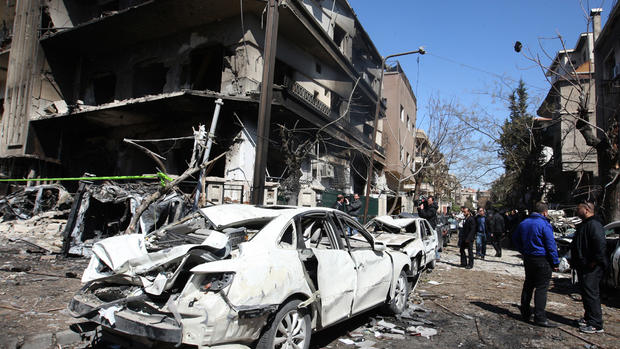Two massive blasts rock Syria's capital
Updated 11 a.m. Eastern time
(CBS/AP) BEIRUT, Lebanon — Two "terrorist explosions" struck security targets in the Syrian capital Saturday morning, killing at least 27 people and wounding 140, the state-run news agency said.
SANA said many of the dead were civilians, including children and senior citizens.
CBS News' George Baghdadi, who's in Damascus, reports many of the wounded were brought to a Red Crescent hospital.
CBS News correspondent Charlie D'Agata, from London, said many of the wounded were in critical condition.
SANA said preliminary information indicated the blasts were caused by car bombs that hit the aviation intelligence department and the criminal security department at around 7:30 a.m local time. Shooting broke out in the wake of the blast and sent residents and others who had gathered in the area fleeing, an Associated Press reporter at the scene said.
SANA posted gruesome photographs of the scene, with mangled and charred corpses, bloodstains on the streets and twisted steel.
"All our windows and doors are blown out," said Majed Seibiyah, 29, who lives in the area. "I was sleeping when I heard a sound like an earthquake. I didn't grasp what was happening until I hear screaming in the street."
D'Agata says, "My colleagues in Damascus describe the twin bombings as the biggest the capital has seen, in terms of the sheer size of the explosions and the damage done. Dramatic footage (on TV in Syria) shows three- and four-story buildings completely demolished. ... Surrounding residential neighborhoods -- these are upscale neighborhoods -- bore the brunt of the blast.
One year into the Syrian revolt, the fight to oust President Bashar Assad is transforming into a nascent civil war. The regime says it is fighting foreign terrorists and armed gangs, denying there is a popular will behind the revolt. But Assad's opponents say they have been forced to carry weapons because the government used tanks, snipers and machine guns to crush peaceful protests.
Syria has seen a string of suicide bombings, the last major one on Feb. 10, when twin blasts struck security compounds in the government stronghold city of Aleppo, killing 28 people.
Damascus, another Assad stronghold, has seen three suicide previous bombings since December but has, says D'Agata, "largely been spared in the violence. Assad has some support in the capital. More than anything is what a colleague in Damascus today described as the solid majority neither backing nor opposing Assad; they just want an end to the violence."
But Baghdadi observes, "The attack-- whoever was behind it -- adds new and ominous dimensions to a conflict that has already taken the country to the brink of civil war. The situation in Damascus has become dramatically more tense in recent weeks, with many residents trying to remain in their homes when possible.
The regime has touted the attacks as proof that it is being targeted by "terrorists" and, says D'Agata, "Attacks like these support Assad's justification that his fight is against terrorists who are determined to destroy the country."
The opposition accuses forces loyal to the government of being behind the bombings to tarnish the uprising.
Nobody has claimed responsibility for the explosions.
The U.N. estimates that more that 8,000 people have been killed since the uprising against Assad began last March.
In recent weeks, Syrian forces have waged a series of heavy offensives against the main strongholds of the opposition — Homs in central Syria, Idlib in the north and Daraa in the south.
The bloodshed fuels the country's sectarian tensions. The military's top leadership is stacked heavily with members of the minority Alawite sect, to which Assad and the ruling elite belong.
Sunnis are the majority in the country of 22 million and make up the backbone of the opposition.
Diplomatic efforts to solve the crisis have so far brought no result. But U.N. envoy Kofi Annan told the Security Council in a briefing Friday that he would return to Damascus even though his recent talks with Assad saw no progress in attempts to cobble together peace negotiations between the two sides.
After the confidential briefing via videolink, Annan told reporters in Geneva that he urged the council "to speak with one voice as we try to resolve the crisis in Syria." Russia and China have blocked U.N. action against Assad's regime.
"The first objective is for all of us to end the violence and human rights abuses and the killings and get unimpeded access for humanitarian access to the needy, and of course the all-important issue of political process that will lead to a democratic Syria," Annan said.
Both Assad and much of the opposition spurned.
To see Charlie D'Agata discussing the explosions with "CBS This Morning: Saturday" co-host Charlie D'Agata, click on the video in the player above.
